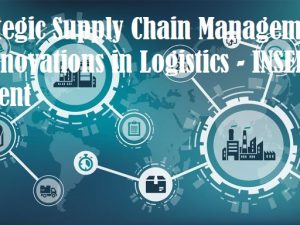Description
The under mentioned paragraph is an extract from an article published by Robert Handfield, Ph.D., Executive Director of the Supply Chain Resource Cooperative, in a Q&A session with John Camp, Director, Logistics Solutions and Transformation at Lenovo in 2013
Big issues in global logistics
Rob Handfield: Hi, I’m here with John Camp, director of logistic solutions and transformation at Lenovo. John manages a lot of the logistics for Lenovo globally and is clearly exposed to a lot of the issues that we’ve been talking about at this conference. John, what do you see as the big challenges, the big issues in global logistics today for Lenovo as you continue to operate globally in all the different markets that you do?
John Camp (Lenovo): One of the key things we are concerned about in the logistics world is increasing the flow of information, not only the physical movement of goods, as our network becomes more complex and becomes more time critical. We’re also very focused on the increase of information and managing the level of complexity that we have in our information chain as well.
Complexity issues with exchanging information
Rob Handfield: I wondered if you could give us some examples of some of the complexities that you see in terms of exchanging information. Is it time zone issues? Is it the format of the data? Is it being able to work with governments, with suppliers, with multiple parties, or maybe all of the above?
John Camp: It literally is all of the above, although most of our concerns right now are being able to build a community, collaborate with our suppliers, our customers, and with our in-house peers. That’s a real critical initiative for us today in managing the flow of information and really shaping our technology road map and some of our key strategic initiatives.
Key initiatives to managing the flow of information
Rob Handfield: I wonder if you might share with us some of the key initiatives that you have today at Lenovo as you seek to be able to manage the flow of information, as you seek to manage big data, and as you try to manage all of the complexity that exists in your global logistics system.
John Camp: Sure, we have a number of initiatives. We want to get closer to our customers, so we’re spending a lot of time and our energies on our customer experience and all of the interactions that we have with our customers, making those an improved differentiator for us in terms of the way our customers deal with us, and then extending that all the way back through our own manufacturing and production resources, all the way through to our suppliers. So for us it’s a challenge of connecting all of the nodes on the supply chain, not only physically but through information. We have a number of initiatives that are focused on customer service and operational aspects of that to run our ever-increasing, ever-complex network.
Emerging technologies, mobile devices, and the horizon
Rob Handfield: Do you see any emerging technologies on the horizon that you think will be important to be able to deal with these things? Whether it’s integration of mobile devices, GPS technology, software as a service, performance analytics as a service, the kinds of things that you read about for instance in a Gartner report. Are you looking at all of those potential things on the horizon?
John Camp (Lenovo): Sure, we definitely are. I think that one of the biggest challenges right now in the supply chain is dealing with all of the information that we have to manage. So, clearly the trend toward big data and improved analytics clearly are on our minds. Moving to the cloud and being able to build a community with our partners and with our customers that gives all access to a single version of the truth is really important to us right now. And we’re really shaping our strategy from a technology and from an internal strategic planning perspective.
Think purchasing and procurement and often what comes to mind is the struggle or battle to make a supplier give you materials or services for the lowest amount of money possible.
However, as global growth stalls and companies are forced to control costs to generate profit, sourcing and procurement could take center stage.
It won’t, however, be about beating up suppliers for every penny. Instead, procurement’s new role will be to forge new relationships with suppliers and increase collaboration. As our friend Chuck Intrieri likes to say, collaboration is at the heart of successful supplier relationship management.
REQUIRED
a) Critically evaluate the logistic strategies that Lenovo is following, and the challengers being faced in the case study whilst unpacking the definition of logistics.
b) List suggestions to further improve the logistic strategies at Lenovo, especially in the light of the current, global Covid–19 pandemic.


